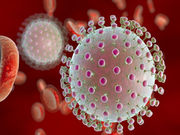Permissive Zika virus infection of primary human placental macrophages, fibroblasts demonstrated
FRIDAY, Aug. 19, 2016 (HealthDay News) — Primary human placental macrophages, known as Hofbauer cells, and placental villous fibroblasts are susceptible to infection by Zika virus, according to research published online Aug. 18 in JCI Insight.
Kellie Ann Jurado, Ph.D., from the Yale University School of Medicine in New Haven, Conn., and colleagues examined potential mechanisms involved in Zika virus crossing the placental barrier.
The researchers demonstrated permissive Zika virus infection of Hofbauer cells and placental villous fibroblasts. Using term placental villous explants, they demonstrated Zika virus infection of Hofbauer cells within the context of the tissue ex vivo. The putative migratory activities of Hofbauer cells may aid in dissemination of Zika to the fetal brain, in addition to amplifying infectious virus within a usually inaccessible area.
“Understanding the susceptibility of placenta-specific cell types will aid future work around and understanding of Zika virus-associated pregnancy complications,” the authors write.
Full Text
Copyright © 2016 HealthDay. All rights reserved.








